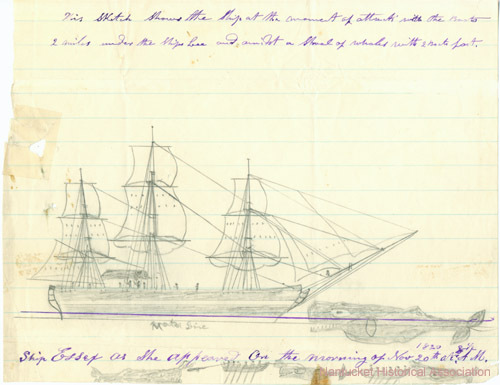
I plan to watch Ron Howard's new film, In The Heart of the Sea, from a parent's perspective. That's because of a boy at the heart of the story named Thomas Nickerson.
In The Heart of the Sea, a bestseller by historian Nathaniel Philbrick, is a true tale about a whale that destroyed the Nantucket whaleship Essex, a disaster that inspired Herman Melville in his writing of the great American classic Moby Dick.
You can listen to Philbrick share the backstory of the Essex with me on this episode of Wavemaker Conversations: A Podcast for the Insanely Curious.
Thomas Nickerson grew up on Nantucket in the early 1800s, when that island was the world's capital of the brutal and highly profitable whaling industry.
It was a place where, Philbrick explained, every boy dreamed of going to sea and hunting whales, and maybe becoming rich as a result.
In 1819, Nickerson, an orphan, became a cabin boy on the Essex. He was only 14, the youngest of the ship's 20-member crew. He knew that the ship might not return for two to three years, if at all.
What he might not have known was how stingy Nantucket's whaleship owners could be in the name of thrift. The provisions were paltry. Philbrick takes us there:
"The men would sit on the deck and there would be a piece of salted beef or pork .. so salty that if you put salt water on it, it actually reduced the salt content."
There was also hardtack -- bread the consistency of brick.
About a year into the voyage, 3-thousand miles off the coast of South America, at a time when Thomas Nickerson would, if he were growing up today, be a freshman in high school, Nickerson was at the helm of the Essex when a giant 85 foot sperm whale sped toward it.
Philbrick picks up the story during our conversation recorded at The Nantucket Book Festival.
"The whale rams the ship on the side, comes up under the vessel, surfaces, springs to life, and then swims ahead of the ship, and comes hurling at it ... rams the Essex in the bow. It fractures like an eggshell.
That was based on the account of the ship's first mate, Owen Chase.
"Just about any kid growing up in America in the 19th century read a version of the Essex in their school reader. It was that much a part of the culture."
Nickerson was rumored to have documented his own memories of the disaster late in life. That version finally surfaced a century and a half after the Essex went down.
In 1980, Nickerson's account, written in a notebook, discovered in an attic, was delivered to the Nantucket Historical Association. It included many details we had not known, including this critical decision point recounted by Philbrick in our Wavemaker podcast:
"After the first hit the whale is stunned, knocked out, floating beside the ship on the starboard side. Feet from the side of the ship, it's tale towards the stern very near the rudder. Chase (the first mate) takes up an 18 foot killing spear ... and is tempted to kill this whale. ... But he notices that the tale is right next to the rudder.
A quick risk-reward calculation was made.
"If he provokes this creature into taking out their rudder, they're gonna be in very big trouble. So he decides not to do it. The whale springs to life and everything else follows."
What followed was a horrific 89 days at sea.
When the five survivors of the initial 20-person crew were finally rescued they were starving and dehydrated. Cannibalism played a role in their survival. So did ingenuity, luck and resilience.
After surviving the Essex, Thomas Nickerson sailed again. He returned to the heart of the sea.
MICHAEL SCHULDER is the host of Wavemaker Conversations: A Podcast for the Insanely Curious. You can subscribe for free here on iTunes.
